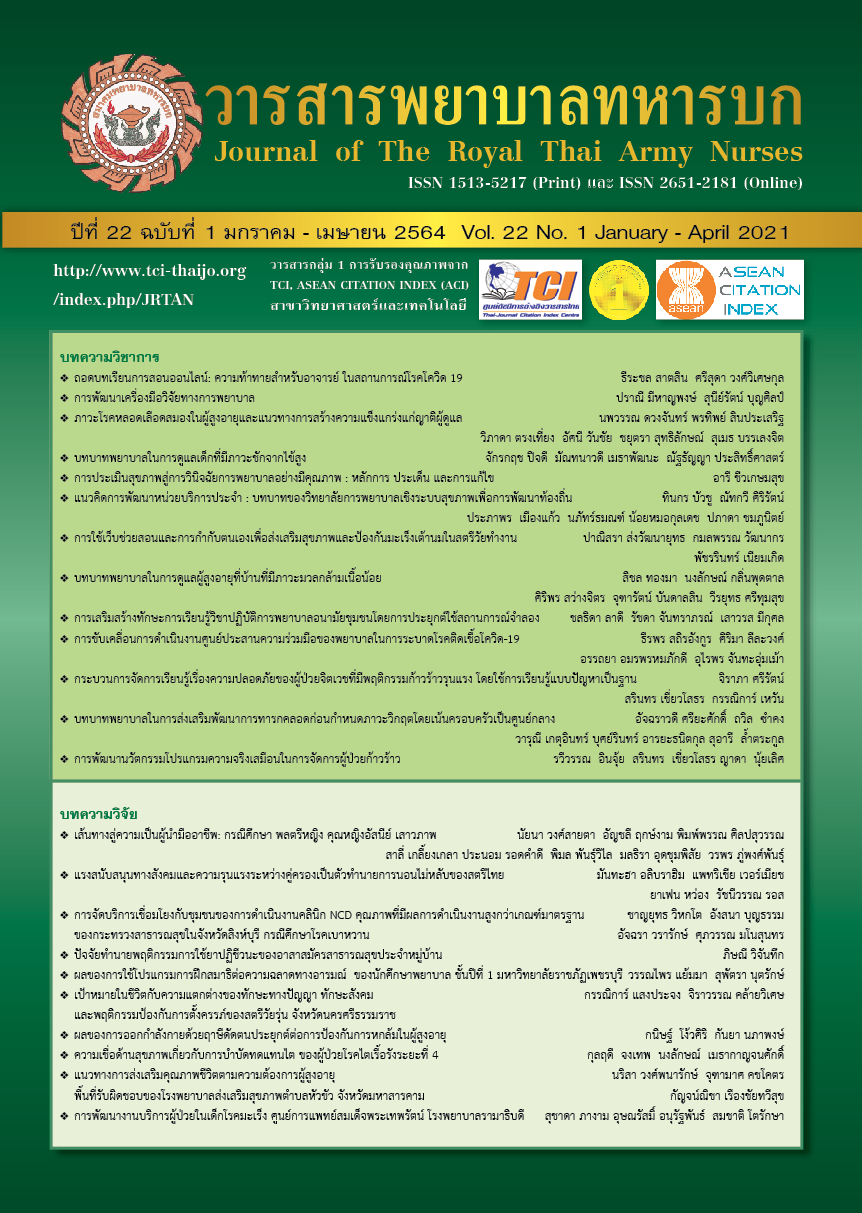A Causal Model of Spiritual Well-being in Persons with End Stage Renal Disease Receiving Hemodialysis
Keywords:
Spiritual well-being, End stage renal disease, HemodialysisAbstract
A model-testing, cross-sectional study was conducted to test a causal model of spiritual well-being in persons with ESRD. A multi-stage random sampling was used to recruit a sample of 270 persons with ESRD who received hemodialysis in Chon Buri Province. Research instruments included six scales of the Spiritual Well-Being, the Memorial Symptom Assessment, the Barthel’s Activities of Daily Living Index, the Perception of Palliative Care, the Duke University Religion Index, and the Multidimensional Scale of Perceived Social Support. Data were analyzed by using descriptive statistics and Structural Equation Modeling.
The results revealed that the modification of the hypothesized model fit the data well ( = 97.495, p = .301, df = 91, CMIN/df = 1.132, GFI = .965, AGFI = .920, and RMSEA =. 016) accounted for 50 – 60.9 percent of variance in prediction of spiritual well-being in persons with ESRD. Symptom experience, social support, activities of daily living, receiving palliative care and religiosity had direct effects on spiritual well-being (β = -0.109, 0.299, 0.186, 0.272 and 0.01, respectively). Symptom experience mediated the link between social support and spiritual well-being. These findings indicate that this causal model is appropriated. It would suggest a direction for the nursing profession to enhance spiritual well-being of persons with ESRD receiving hemodialysis through providing social support, palliative care and religiosity, reducing symptom experience and improving activities daily living.
Downloads
References
O’ Brien M. A middle range theory of spiritual well-being in illness. In Spirituality in nursing standing on holy ground. Jones and Bartlett publishers; 2008.
Soowit B, Pongsathonviboon K, Wangkachornkiat C. Panasakulkan S. Needs assessment of spiritual well-being in head neck cancer patienys, Faculty of Medicine Vajira hospital, Navamindrahiraj University.Journal of the Royal Thai Army Nurses. 2019; 20(1): 226-235. (in Thai).
Amirmohamadi M, Borhani F, Kiani M, AlmasiHashiani A, Naghavi B. The correlation between spiritual wellbeing and depression in elderly patients with cancer in Iran. Journal of Family Medicine. 2017; 15(10):129-136.
Ghabaee D, Bagheri-Nesami M, Shafaroudi M. Relationship between spiritual well-being and quality of life in multiple sclerosis patients. Journal of Nursing and Midwifery Sciences. 2016; 3(2): 25-31.
Kunchuvejsiri S, Chancharoenthana W, Kiattisunthorn K, Khotchaseni P, Chailimpamontree W, Trakarnvanich T. Text Book of Chronic Kidney Disease (1st ed). Bangkok: CU Print; 2016.
Nephology Society of Thailand. Clinical Practice Recommendation for the Evaluation and Management of Chronic Kidney Disease in Adults 2015. Bangkok: Takeda.
Fradelos E, Tsaras K, Tzavella F, Koukia E, Papathanasiou I, Alikari V, et al. Clinical, social and demographics factors associated with spiritual wellbeing in end stage renal disease. Advances in Experimental Medicine and Biology. 2017; 987: 77-88.
Artsanthia J, Tillaput J. The effect of palliative care to quality of life of people who living with end stage renal disease in community. Journal of The Royal Thai Army Nurse. 2018; 20(1): 185-193. (in Thai).
Eslami A, Rabiei L, Khayri F, Rashidi-Nooshabadi M, Masoudi R. Sleep quality and spiritual well-being in hemodialysis patients. Journal of Iran Red Crescent Medicine. 2014; 16(7):1-7.
Taheri-Kharameh Z. The relationship between spiritual well-being and stress coping strategies in hemodialysis patients. Health, Spirituality, and Medicine Ethics. 2016; 3(4): 24-48.
Hasegawa T, Kawai M, Kuzuya N, Futamura Y, Horiba A, Ishiguro T, et al. Spiritual well-being and correlated factors in subjects with advanced COPD or lung cancer. Respiratory Care. 2017; 62(5): 544-549
Hair F, Black C, Babin J, Anderson E. Multivariate data analysis (7th ed.). Upper Saddle River, N.J.: Pearson/ Prentice Hall; 2010.
Ellison, C.W., & Paloutzian, R. F. Loneliness, spiritual well-being, and quality of life. In: Peplau LA & Perlman D, eds. Loneliness: A sourcebook of current theory, research and therapy. New York: Wiley. 1982.
Noipiang P. Perceived severity of illness, social support, and spiritual well-being among breast cancer patients. Master’s Thesis. Chiang Mai: Faculty of Graduate School, Chiang Mai University. 2002. (in Thai)
Portenoy R, Thaler H, Kornblith A, Lepore J, Friedlander-Klas H, Kiyasu E, et al. The Memorial Symptom Assessment Scale: An instrument for the evaluation of symptom prevalence, characteristics and distress. EurQuan Journal. 1994; 30(9):1326-33.
Mahoney F, Barthel D. Functional evaluation: The Barthel Index. Maryland state Medical Journal. 1965; 14(1):56-61.
Milne D, Aranda S, Jefford M, Schofield P. Development and validation of a measurement tool to assess perceptions of palliative care. Psychooncology. 2013; 22(4): 940-6
Koenig H, Bussing A. The Duke University Religion Index (DUREL): A five-item measure for use in epidemiological studies. Religions. 2010; 1(1):78-85.
Wongpakaran T, Wongpakaran N, Ruktrakul R. Reliability and validity of the Multidimension Scale of Social Support (MSPSS): Thai version. Clinical Practice & Epidemiology in Mental Health. 2011; 7: 161-166.
Zimet D, Dahlem W, Zimet G, Farley K. The Multidimensional Scale of Perceived Social Support. Journal of Personality Assessment. 1988; 52: 30-41.
Rabow M, Knish S. Spiritual well-being among outpatients with cancer receiving concurrent oncologic and palliative care. Journal of Support Care Cancer. 2015; 23: 919-923.
Get-Kong S, Hanucharurnkul S, McCorkle R, Viwatwongkasem C, Junda T, Ittichaikulthol W. Symptom experience, palliative care and spiritual well-being among Thais with advanced cancer. Pacific Rim Internal Journal Nursing Research. 2010; 14(3): 219-234.
Mongkhonittivech N, Yeammisri W. Factors predicting spiritual well-being among the elderly with chronic illness. Journal of Nursing Science & Health. 2016; 39(2): 1-11.
Hasegawa T, Kawai M, Kuzuya N, Futamura Y, Horiba A, Ishiguro T, et al. Spiritual well-being and correlated factors in subjects with advanced COPD or lung cancer. Respiratory Care. 2017; 62(5): 544-549.
Chen Y, Lin L, Chuang L, Chen M. The relationship of physiopsychosocial factors and spiritual well-being in elderly residents: Implications for evidence-based practice. Worldviews on Evidence-Based Nursing. 2017; 14(6): 484-491.
Downloads
Published
How to Cite
Issue
Section
License
บทความหรือข้อคิดเห็นใดใดที่ปรากฏในวารสารพยาบาลทหารบกเป็นวรรณกรรมของผู้เขียน ซึ่งบรรณาธิการหรือสมาคมพยาบาลทหารบก ไม่จำเป็นต้องเห็นด้วย
บทความที่ได้รับการตีพิมพ์เป็นลิขสิทธิ์ของวารสารพยาบาลทหารบก
The ideas and opinions expressed in the Journal of The Royal Thai Army Nurses are those of the authors and not necessarily those
of the editor or Royal Thai Army Nurses Association.






